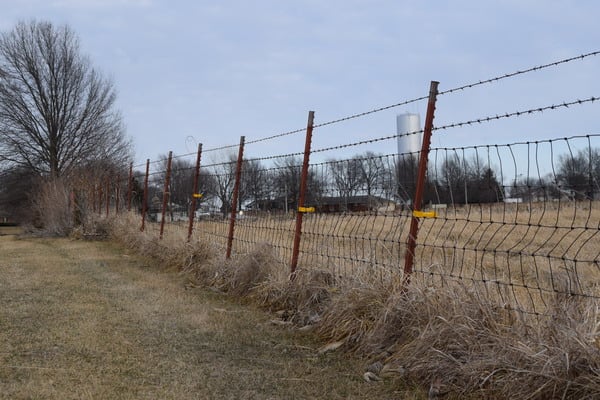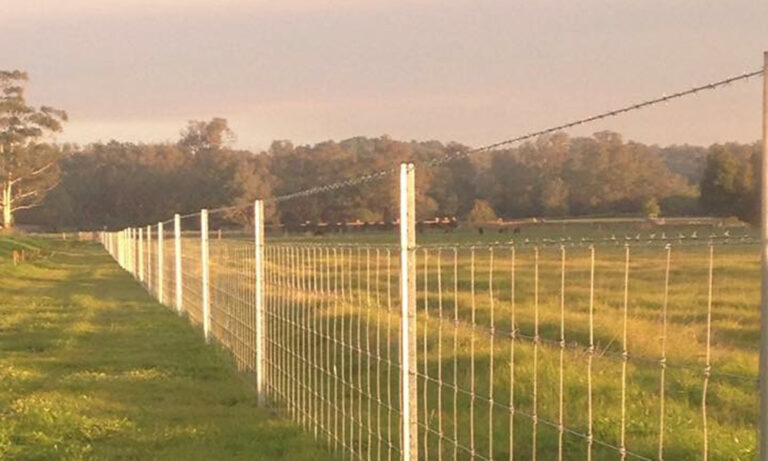Yorkshire, with its lush landscapes, rolling hills, and expansive moorlands, is a region renowned for its agricultural heritage. For farmers in this beautiful part of the UK, protecting livestock and crops is a top priority. As farming practices evolve, so too does the technology available to safeguard land and animals. One such advancement is electric fencing, which has become an increasingly popular choice for farms in Yorkshire. In this blog post, we will explore the numerous benefits of electric fencing, focusing on its application in farms across Yorkshire, including the bustling areas around Leeds. We will also discuss the growing importance of Leeds fencing solutions and how farmers can benefit from specialised fencing in Leeds.
1. Improved Security and Protection for Livestock
One of the most significant advantages of electric fencing is its ability to provide superior security and protection for livestock. Yorkshire farmers are often faced with the challenge of keeping their animals safe from both natural predators and human threats. Traditional fencing methods, such as barbed wire or wooden posts, may not always be sufficient to deter these threats. Electric fences, however, deliver a mild electric shock to any animal or person that touches them, acting as a powerful deterrent.
This increased level of security is particularly beneficial for farmers in the Leeds area, where the proximity to urban environments can sometimes lead to higher risks of trespassing or theft. By investing in Leeds fencing solutions that incorporate electric fencing, farmers can significantly reduce the chances of livestock theft and unauthorised access to their property.
Moreover, electric fencing can be customised to suit the specific needs of different types of livestock. Whether you’re raising sheep, cattle, or horses, electric fencing can be adjusted in height and voltage to ensure the optimal level of protection. This flexibility is a key reason why many farmers in Yorkshire, including those in and around Leeds, are turning to electric fencing as their preferred choice.
2. Cost-Effective and Long-Lasting
Another compelling reason for Yorkshire farmers to consider electric fencing is its cost-effectiveness. Compared to traditional fencing options, electric fencing can be significantly cheaper to install and maintain. The materials required for electric fencing are often less expensive, and the installation process is generally quicker and less labour-intensive.
For farmers looking for reliable fencing in Leeds, this cost-saving aspect can be particularly appealing. With the rising costs of farming inputs, any opportunity to reduce expenses without compromising on quality is highly valued. Electric fencing offers a durable solution that can last for many years with minimal maintenance. This long-lasting nature is especially beneficial for large farms, where the cost of replacing or repairing traditional fencing can quickly add up.
In addition to the lower initial costs, electric fencing also requires less maintenance over time. Traditional fences can suffer from wear and tear, weather damage, and even damage from livestock. In contrast, electric fences are designed to be more resilient to these challenges. With fewer components that can break or degrade, farmers in Leeds and the broader Yorkshire region can enjoy a more reliable and cost-effective fencing solution.

3. Versatility and Adaptability
Electric fencing is incredibly versatile, making it suitable for a wide range of applications on Yorkshire farms. Whether you need to create a temporary enclosure for rotational grazing or secure a permanent boundary around your property, electric fencing can be easily adapted to meet your needs.
This adaptability is a significant advantage for farmers who require flexible fencing solutions. For instance, in the Leeds area, where farms may need to adjust their boundaries or grazing areas frequently, electric fencing offers a convenient and straightforward option. Farmers can quickly move or modify electric fences as needed, ensuring that their livestock always have access to fresh pasture while keeping them contained and safe.
Moreover, electric fencing can be integrated with existing fencing systems. This means that farmers who already have traditional fences in place can enhance their effectiveness by adding electric wires or strands. This hybrid approach is often seen on farms in Leeds and other parts of Yorkshire, where the combination of electric and traditional fencing provides a comprehensive security solution.
4. Enhanced Grazing Management
Effective grazing management is essential for maintaining healthy pastures and optimising livestock production. Electric fencing plays a crucial role in this regard by allowing farmers to implement rotational grazing systems more effectively. By dividing large fields into smaller paddocks with electric fencing, farmers can control the grazing patterns of their livestock, ensuring that each area is grazed evenly and then given time to recover.
This approach not only promotes healthier pastures but also helps to prevent overgrazing, which can lead to soil erosion and reduced forage quality. For farmers in Yorkshire, where the quality of pasture is often a critical factor in livestock production, the ability to manage grazing effectively is invaluable.
In the Leeds area, where land availability can sometimes be limited, electric fencing provides a practical solution for maximising the use of available pasture. By creating temporary or semi-permanent paddocks, farmers can ensure that their livestock are always grazing on the best possible forage, leading to healthier animals and improved productivity.
5. Environmental Benefits
Electric fencing is not only beneficial for farmers and livestock but also for the environment. Traditional fencing methods can sometimes cause damage to the natural landscape, particularly if heavy machinery is required for installation or maintenance. In contrast, electric fencing is generally less intrusive and can be installed with minimal disruption to the surrounding environment.
For farmers in Yorkshire, who are often stewards of some of the UK’s most beautiful natural landscapes, this environmental aspect is an important consideration. By choosing electric fencing, farmers can help to preserve the natural beauty of their land while still ensuring the security and protection of their livestock.
Additionally, electric fencing can help to reduce the risk of soil erosion and water pollution. By controlling grazing patterns and preventing livestock from entering sensitive areas, farmers can protect vulnerable ecosystems and water sources. This is particularly relevant in areas like Leeds, where farms are often located near rivers and streams that could be adversely affected by uncontrolled livestock access.
6. Ease of Installation and Maintenance
Installing traditional fencing can be a time-consuming and labour-intensive process, often requiring specialised equipment and skills. In contrast, electric fencing is relatively easy to install, making it an attractive option for farmers who want to save time and effort.
For farmers in the Leeds area, where labour costs can be higher than in more rural parts of Yorkshire, the ease of installation of electric fencing is a significant advantage. Many electric fencing systems are designed to be user-friendly, allowing farmers to set them up quickly and efficiently without the need for professional assistance.
Maintenance is also straightforward with electric fencing. Unlike traditional fences, which can require frequent repairs and replacements, electric fences are designed to be low-maintenance. The main components, such as the energiser and wires, are durable and can withstand the elements for many years. Regular checks to ensure the system is functioning correctly are usually all that is required, making electric fencing a convenient and hassle-free option for farmers in Leeds and across Yorkshire.
7. Safety for Animals and Humans
While the idea of an electric fence might initially seem intimidating, modern electric fencing systems are designed to be safe for both animals and humans. The electric shock delivered by these fences is non-lethal and is intended to provide a brief but memorable deterrent. It is this discomfort, rather than pain or injury, that keeps livestock within the designated areas.
This safety feature is especially important for farmers with a diverse range of animals or who operate in areas with frequent public access, such as the outskirts of Leeds. The ability to secure animals without causing them harm is a major benefit of electric fencing, providing peace of mind for farmers who are committed to animal welfare.
Furthermore, electric fencing can also enhance safety for farm workers and visitors. Traditional fences, especially those with barbed wire, can pose a risk of injury. In contrast, electric fences are designed with smooth wires that do not cause physical harm beyond the initial shock. This reduces the risk of accidents and injuries on the farm, creating a safer environment for everyone.
8. Integration with Modern Technology
The integration of electric fencing with modern technology is another benefit that is becoming increasingly important for farmers in Yorkshire. Many electric fencing systems can now be connected to remote monitoring and control systems, allowing farmers to manage their fences from anywhere using a smartphone or computer.
This technology is particularly useful for large farms or those located in more remote areas of Yorkshire, where checking fences in person can be time-consuming and impractical. By using remote monitoring systems, farmers can quickly identify and address any issues with their electric fencing, ensuring that their livestock remains secure at all times.
In areas like Leeds, where many farmers are adopting modern farming practices and technologies, the ability to integrate electric fencing with other systems is a significant advantage. Whether it’s receiving alerts about a fence breach or adjusting fence settings remotely, this technological integration makes electric fencing a future-proof solution for farmers in the region.
Electric fencing offers a host of benefits for farmers in Yorkshire, from improved security and cost-effectiveness to environmental sustainability and ease of use. For those in the Leeds area, where both urban pressures and rural traditions coexist, the adaptability and advanced features of electric fencing make it an ideal choice. By investing in reliable Leeds fencing solutions, farmers can protect their livestock, enhance their operations, and contribute to the preservation of Yorkshire’s stunning landscapes.
As farming continues to evolve in the 21st century, it’s clear that electric fencing will play an increasingly important role in ensuring the safety, productivity, and sustainability of farms in Leeds and across Yorkshire. Whether you’re looking for cost-effective fencing in Leeds or seeking innovative ways to manage your land, electric fencing provides a versatile and reliable solution that meets the needs of modern agriculture.

